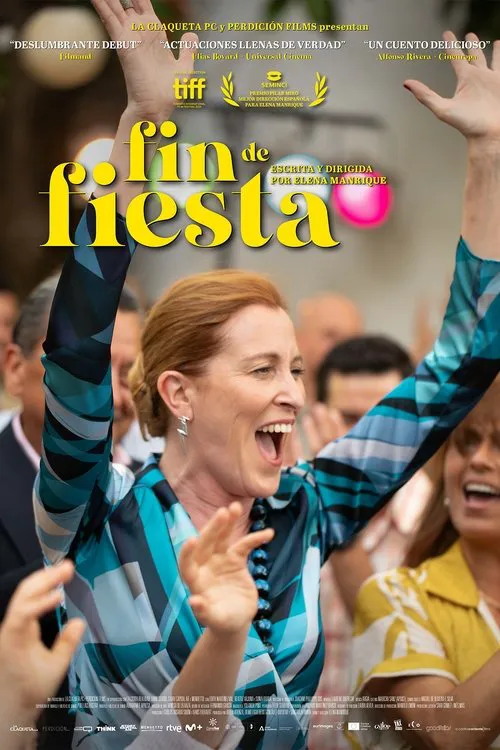The Party's Over

Plot
The Party's Over, directed by David Desantos, is a 1994 drama film that explores the complexities of isolation, prejudice, and human connections through the story of Bilal, a young Senegalese immigrant, and his tumultuous relationship with the inhabitants of an Andalusian manor house. The film masterfully weaves together themes of identity, culture, and class, creating a rich tapestry of emotions and experiences that leave the audience pondering the nature of belonging and acceptance. The film opens with Bilal, a determined and charismatic young man from Senegal, who boards a cargo ship in Morocco bound for Spain. As the vessel navigates the treacherous waters of the Mediterranean, Bilal finds himself among a group of desperate migrants, each with their own story of fleeing poverty, war, or persecution. When the ship is intercepted by the authorities, Bilal must rely on his wits and cunning to evade capture and disappearance. He manages to slip away unnoticed, finding himself in the midst of unfamiliar landscape and language, with only his resourcefulness to guide him. Disoriented and hungry, Bilal stumbles upon the manor house of the beautiful and enigmatic Carmina, a member of the Spanish nobility. It is here that he discovers a sanctuary that will soon turn into a prison. Lupe, Carmina's loyal and warm-hearted maid, takes an instant liking to Bilal, offering him food, shelter, and a listening ear. As Bilal becomes increasingly entrenched in the household, he and Lupe develop a deep and empathetic bond, marked by long conversations, laughter, and stories of their respective cultures. Through Lupe, Bilal gains a rare window into the complexities of Spanish society, complete with its historical traditions, customs, and myths. In stark contrast, Carmina's behavior towards Bilal is erratic, conflicted, and unsettling. She alternates between displaying a passive curiosity towards this new presence in her home to expressions of deep disdain and hostility, caught between a maternal kindness and an aristocratic disdain for "the Other." Her treatment of Bilal serves as a microcosm for the internalized xenophobia and privilege that have characterized the character of her class for generations. As the days pass, Bilal's presence begins to disrupt the fragile balance of the household, threatening the very foundations of Carmina and Lupe's lives. The patriarch of the family, Señor Alejandro, dismisses Bilal as a mere thief and invader, while his wife, Carmina, struggles to reconcile her own fears and desires with her growing sense of responsibility towards the young African immigrant. Meanwhile, Bilal, desperate to prove his worth and find acceptance, must navigate the labyrinthine politics of the household, all while keeping his true identity as an undocumented immigrant hidden from prying eyes. Through David Desantos' masterful direction, The Party's Over raises vital questions about power, inequality, and the human condition. How do the privileged classes justify their treatment of the marginalized? What lies beneath the façade of nobility and elegance? How do cultural differences shape our perceptions of one another? As the narrative unfolds, the intricate relationships between the characters – including Bilal, Carmina, Lupe, and Señor Alejandro – come to represent the fragile societal constructs that underlie our collective identities. The Party's Over also offers a deep exploration of the migrant experience, particularly the desperate journeys undertaken by those fleeing war, poverty, or persecution. Bilal's narrative becomes a poignant reminder of the struggles faced by countless individuals seeking a better life in foreign lands. His story highlights the vulnerability and resilience that define the human spirit in the face of adversity, illuminating both the cruel realities of xenophobia and the quiet acts of kindness that can bridge cultural divides. In the end, The Party's Over leaves us with more questions than answers, prompting us to reflect on the true meaning of home, belonging, and acceptance. Through its nuanced portrayal of a complex, entwined web of lives, the film issues a clarion call for empathy and understanding, challenging us to reexamine our assumptions about the world and ourselves.
Reviews
Aitana
1. China is poorer than the US and the UK, yet it saves more money and lends it to wealthier nations like the US and the UK to spend. 2. Unlike the US and the UK, Germany doesn't rely heavily on borrowing. Its manufacturing sector hasn't declined; instead, it has thrived. 3. The situation in Greece after the debt crisis is dire, with widespread economic hardship. A major reason is that the government borrowed excessively, primarily to improve living standards, but with little to no improvement in productivity, leaving them with insufficient exportable goods to repay the debt.
Paola
Industry is truly the foundation of a prosperous nation. The film's critique of the banking system is spot-on. Banking should serve as a conduit for national economic lending, not merely a tool to fuel mass consumerism.
Nicholas
Envy paints an overly rosy picture of China, while Western realities remain misunderstood. The film portrays a universal emptiness, filled only by the fleeting pleasures of consumerism. It presents a world perpetually delightful, save for the perceived failings of Germany. Beyond a government deemed incompetent, however, the Greek people's attitudes mirror those of displaced farmers in China. The consequences of cultural mixing are presented negatively. A cynical, dismissive chuckle concludes the review.
Phoenix
The depiction of the situation in China is almost too accurate, and I'm afraid we might be following in its footsteps ╮(╯-╰)╭
Talia
Pragmatism builds a nation. Finance and industry are a cooperative community that should support each other. Over-affirmation can lead to ruin, but this film still holds value as a point of reference for the present day.
Recommendations




